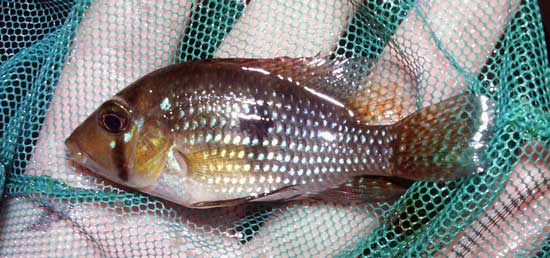'Geophagus' sp. "bahia red"
Bahia Red Eartheater

Above: 'Geophagus' sp. "bahia red". Photo by Sam Borstein.
Etymology:
Genus- Geos= Earth (Greek), Phagein= Eat (Greek)
Species- bahia red= Named after the province of Bahia in Brazil as well as the color of the fish.
Intro:
'Geophagus' sp. "bahia red" is an undescribed eartheater from Brazil and a rather new addition to the aquarium hobby. This species is very similar to the Pearlscale Eartheater 'Geophagus' brasiliensis. Coloration is slightly different from the Pearlscale Eartheater, with less spotting and a rosy color in the fins and face. It is unknown whether this species is distinct or not from the 'Geophagus' brasiliensis or not. It has characteristics of that species as well as another similar fish from the region 'Geophagus' obscurus (Weidner, 2000).
The Geophagines are split up into complexes. The 'Geophagus' crassilabrus and 'Geophagus' brasiliensis complexes are awaiting desriptions for new genera.
- Geophagus- Contains species like the Geophagus altifrons, and Geophagus proximus
- 'Geophagus' crassilabrus complex- Thes are all the immediate mouthbrooding Geophagus like 'Geophagus' steindachneri.
- 'Geophagus' brasiliensis complex- All the Pearlscale Eartheaters like 'Geophagus' brasiliensis and 'Geophagus' iporangensis.
You will commonly see 'Geophagus' written in quotes like this because it doesn't represent the other Geophagus species. The true Geophagus species are those of the Geophagus altifrons, Geophagus brokopondo, and Geophagus dicrozoster types. The Red Hump and Brasiliensis group of 'Geophagus' will eventually be assigned to their own genus (Weidner, 2000).
Distribution:
'Geophagus' sp. "bahia red" is found in coastal rivers in the of the province Bahia in Brazil. These fish have been found in brackish water. Usually this species is associated with vegetation.
Size, Maturity, and Sexual Dimorphism:
Size: Males- 10 inches, Females-6 inches
Maturity: 2.5 inches
Sexual Dimorphism: Males are larger than females and may develop a nuchal hump. Males also have more spangles on their flanks and longer fins.
Care:
'Geophagus' sp. "bahia red" is an undemanding fish. This fishis tollerant of various types of water throughout its range and is hardy. I kept mine in chicago tap water, 7.4 pH liquid rock, and they did fine.
'Geophagus' sp. "bahia red" is not very aggressive and is a prime candidate for a community tank. Behavior in general is very similar to 'Geophagus' brasiliensis. Good tankmates would make other larger, mild South American cichlids as well as milder Central American cichlids. This species can also be mixed with mild haplochromines and mbuna in larger tanks and do well. Like all Geophagus, this is a sand sifting species and does best when kept on a sand substrate.
Diet:
'Geophagus' sp. "bahia red" is an omnivore, searching for edibles by sifting through the sand. In an aquarium this fish will accept almost any kind of prepared food. I like spectrum and tetra cichlid sticks as they weight on the fish and keep them in good condition.
Breeding:
Breeding 'Geophagus' sp. "bahia red" is a fairly easy task. Courting is done in the typical Pearlscale Eartheater manner. I've found fish of the 'Geophagus' brasiliensis complex prefer spawning in caves with small openings. Of the three species I've bred, they have all chosen these small caves with little oppenings as nesting sites. If your fish haven't bred yet, I recommend adding some caves and more secluded areas to your tank.
What is nice about the 'Geophagus' brasiliensis complex fish is that they spawn at a small size. The number of eggs produced correlates to the size of the female, with larger spawns coming from larger females. Typically 150-500 eggs are laid. These eggs are tiny and hatch in about 3-4 days. After another 3-4 days, they are free swimming. I've had mixed results leaving the adults with the fry and would recommend siphoning some out if you want to raise some babies.
The fry are easy to raise and do great on baby brine shrimp and then crushed flake. By two months they are usually around an inch long.
Conclusion:
'Geophagus' sp. "bahia red" is a nice fish to keep. It's a newcommer to the hobby and a welcome addition. It may be difficult to find this fish, but if you like Pearlscale Eartheaters you should pick them up.
References:
- Weidner, T., (2000) South American Eartheaters. Cichlid Press, El Paso.
